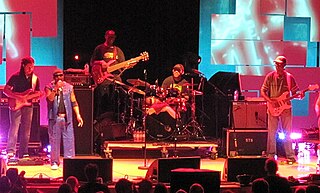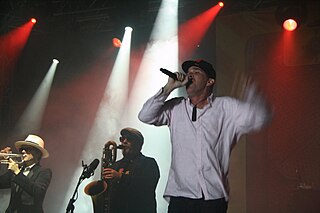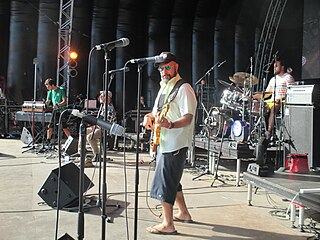
Reggae is a music genre that originated in Jamaica in the late 1960s. The term also denotes the modern popular music of Jamaica and its diaspora. A 1968 single by Toots and the Maytals, "Do the Reggay", was the first popular song to use the word reggae, effectively naming the genre and introducing it to a global audience. While sometimes used in a broad sense to refer to most types of popular Jamaican dance music, the term reggae more properly denotes a particular music style that was strongly influenced by traditional mento as well as by American jazz and rhythm and blues, and evolved out of the earlier genres ska and rocksteady. Reggae usually relates news, social gossip, and political commentary. It is instantly recognizable from the counterpoint between the bass and drum downbeat and the offbeat rhythm section. The immediate origins of reggae were in ska and rocksteady; from the latter, reggae took over the use of the bass as a percussion instrument.
Salmonella Dub is a dub/drum n bass/reggae/roots band from New Zealand. The band was formed in 1992 by Andrew Penman, Dave Deakins, and Mark Tyler. The band has toured extensively throughout New Zealand, Australia, and Europe, including the UK and Ireland.

"Punky Reggae Party" is a song by Bob Marley, recorded and released in 1977. Not appearing on any studio album, it was released in 1977 as a 12-inch single in Jamaica only on the Tuff Gong and Lee Perry's Black Art labels, as a B-side to the "Jamming" single on Chris Blackwell's Island Records label in some countries and was later released as a live single on Babylon by Bus. Subsequently, it appeared on a number of compilations and "Best of" albums as well as the Deluxe Edition of Exodus and the 2002 CD reissue of Legend.

The Maytals, known from 1972 to 2020 as Toots and the Maytals, are a Jamaican musical group, one of the best known ska and rocksteady vocal groups. The Maytals were formed in the early 1960s and were key figures in popularizing reggae music.
There are several subgenres of reggae music including various predecessors to the form.

Frederick Nathaniel "Toots" Hibbert, was a Jamaican singer and songwriter who was the lead vocalist for the reggae and ska band Toots and the Maytals. A reggae pioneer, he performed for six decades and helped establish some of the fundamentals of reggae music. Hibbert's 1968 song "Do the Reggay" is widely credited as the genesis of the genre name reggae. His band's album True Love won a Grammy Award in 2005.

Fat Freddy's Drop is a New Zealand seven-piece band from Wellington, whose musical style has been characterised as any combination of dub, reggae, soul, jazz, rhythm and blues, and techno. Originally a jam band formed in the late 1990s by musicians from other bands in Wellington, Fat Freddy's Drop gradually became its members' sole focus. Band members continued playing with their other respective groups—The Black Seeds, TrinityRoots, Bongmaster, and others—for much of their 20-year career. Fat Freddy's Drop are known for their improvised live performances. Songs on their studio albums are versions refined over years of playing them live in New Zealand and on tour abroad.

Urban Pasifika is a New Zealand subgenre of hip hop, that developed primarily among Pasifika New Zealanders in South Auckland. Drawn from alternative hip hop and R&B influences, it was quickly blended with Pacific Island or Māori instrumentation and traditional songwriting and singing and rapping in a variety of Polynesian languages, such as Māori, Samoan, Niuean and Tongan. The genre's genesis in the 1980s blossomed into a unique, globally enrapturing cultural scene in its homeland of Auckland, especially in the next decade. Urban Pasifika is one of the most popular music genres to arise from New Zealand, and helped cement Auckland's reputation on the world stage as a major cultural centre, and the most ethnically Polynesian city in the world.

TrinityRoots are a band based in Wellington, New Zealand. Although they are commonly associated with New Zealand reggae they also embody a stripped back, jazz and soul-influenced rhythmic sound, which often builds up to highly emotional drum- and guitar-led crescendos.
Beverley's was a Jamaican record label active between 1961 and 1971, owned by the record producer Leslie Kong. Beverley's was essential to the development of ska and rocksteady into reggae. The label launched the careers of Jimmy Cliff and Bob Marley, having released Cliff's first recording "Dearest Beverley" in 1961 and Marley's early singles "Judge Not" and "One Cup of Coffee" in 1962.

Conscious Roots 2 was released in 2005. The album is the 2nd edition of the (NZ) series.

Conscious Roots was released in 2004. The album is the 1st edition of the (NZ) series.

Katchafire are an all Māori New Zealand roots reggae band from Hamilton, New Zealand.

Revival is the debut studio album by New Zealand band Katchafire, released on 4 June 2003. Released after the success of the band's debut single "Giddy Up" (2002), the album was a commercial success, and led to a new wave of popular New Zealand reggae musicians.
Reggae is a music genre that originated in Jamaica in the late 1960s. Australia has several bands and sound systems that play reggae music in a style faithful to its expression in Jamaica. Australia has a relatively small Jamaican community, but reggae penetrated local consciousness via the popularity of reggae among the non-Jamaican population of England in the 1960s and 1970s. Many indigenous musicians have embraced reggae, both for its musical qualities and its ethos of resistance. Examples include Mantaka, No Fixed Address, Zennith and Coloured Stone.
Rhombus are a dub/drum and bass/reggae/roots band from Wellington, New Zealand.
The Victoria Ska and Reggae Festival aka "Ska Fest" is a music festival that takes place every summer in Victoria British Columbia, Canada. The festival is organized and executed by the Victoria BC Ska Society, a non-profit organization, and over 200 volunteers. It is the longest running ska festival in North America. Despite its name, it has also featured artists from a broad spectrum of genres including punk rock, hip-hop, soul music, calypso music, jazz, and more.

"Sensitive to a Smile" is a single from the New Zealand reggae band Herbs from the Sensitive to a Smile album. The single reached #9 in the New Zealand chart.
La De Da was an annual music festival held at Daisybank Farm, in Martinborough, New Zealand with approximately 10,000 attendees.

Paul Douglas is a Jamaican Grammy Award-winning drummer and percussionist, best known for his work as the drummer, percussionist and bandleader of Toots and the Maytals. His career spans more than five decades as one of reggae's most recorded drummers. Music journalist and reggae historian David Katz wrote, “dependable drummer Paul Douglas played on countless reggae hits."












